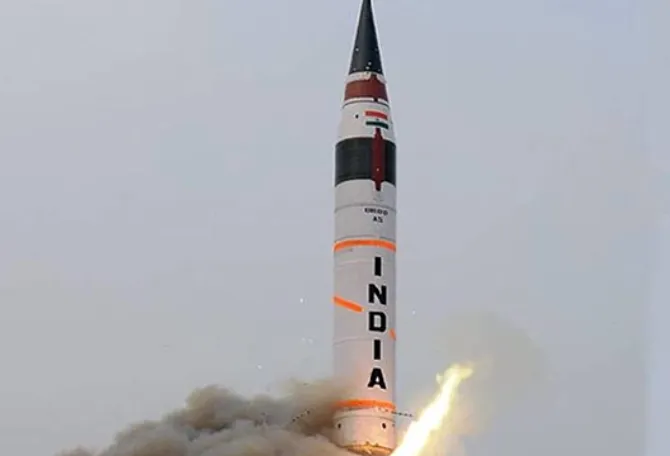-
CENTRES
Progammes & Centres
Location
यूरोपीय संघ के अलग अलग देशों से भारत द्वारा लगातार द्विपक्षीय संपर्क बढ़ाने से सहयोग को आगे बढ़ाने का मौक़ा मिला है.

ये लेख हमारी सीरीज़, पोखरण के 25 साल: भारत के एटमी सफर की समीक्षा का एक हिस्सा है.
1998 में 11 से 13 मई के बीच भारत ने एक के बाद एक कई परमाणु परीक्षण करके ख़ुद को एटमी ताक़त वाला देश घोषित किया था. पूर्व राष्ट्रीय सुरक्षा सलाहकार शिवशंकर मेनन ने अपनी किताब, च्वाइस: इनसाइड दि मेकिंग ऑफ इंडियन फॉरेन पॉलिसी में भारत द्वारा 1998 में परमाणु परीक्षण करने के पीछे का तर्क बख़ूबी बयान किया है. अपनी किताब में मेनन कहते हैं कि, ‘1990 के दशक के आख़िरी वर्षों में भारत ऐसे हालात में था, जहां उसके दो पड़ोसी देश चीन और पाकिस्तान परमाणु हथियारों से लैस हो चुके थे, जिके साथ भारत, अपनी आज़ादी के बाद युद्ध लड़ चुका था. ये दोनों ही देश अपनी एटमी क्षमताओं का विकास करने के साथ साथ एशिया में परमाणु तकनीक के प्रसार के लिए मिलकर काम कर रहे थे. परमाणु तकनीक का प्रसार करने की अंतरराष्ट्रीय व्यवस्था इस स्थिति में नहीं थी कि वो भारत की इस समस्या का समाधान दे सके. इसी वजह से भारत ने 1998 में ख़ुद को एटमी ताक़त से लैस राष्ट्र घोषित करने का फ़ैसला किया.’ तत्कालीन वाजपेयी सरकार ने कहा कि भारत अपने परमाणु हथियारों का इस्तेमाल केवल आत्मरक्षा के लिए करेगा और अपनी क्रेडिबल मिनिमन डेटरेंस (CMD) सिद्धांत के तहत परमाणु हथियारों का पहले इस्तेमाल नहीं करने की ‘नो फर्स्ट यूज़’ (NFU) नीति का एलान किया. वैसे तो ये परमाणु परीक्षण भारत को एटमी हमले के ख़तरे से सुरक्षित करने के लिए किए गए थे. लेकिन, पश्चिमी देशों में इसे लेकर बहुत हंगामा हुआ था. परमाणु परीक्षण के बाद, अमेरिका ने भारत पर आर्थिक प्रतिबंध लगा दिए थे, तो जापान ने मदद रोकने का ऐलान किया था. लेकिन, भारत के एटमी टेस्ट को लेकर यूरोपीय संघ के देश बंटे हुए थे; ब्रिटेन ने इनकी खुलकर निंदा नहीं की थी; और, जर्मनी, स्वीडन और डेनमार्क जैसे देशों ने भारत को दी जाने वाली मदद रोक दी थी. हालांकि, उसके बाद से परमाणु अप्रसार के मुद्दे समेत भारत और यूरोप के रिश्ते लंबा सफर तय कर चुके हैं.
परमाणु परीक्षण के बाद, अमेरिका ने भारत पर आर्थिक प्रतिबंध लगा दिए थे, तो जापान ने मदद रोकने का ऐलान किया था. लेकिन, भारत के एटमी टेस्ट को लेकर यूरोपीय संघ के देश बंटे हुए थे; ब्रिटेन ने इनकी खुलकर निंदा नहीं की थी.
परमाणु अप्रसार, हथियारों के निर्यात पर नियंत्रण और निरस्त्रीकरण जैसे मुद्दे यूरोपीय देशों और पूरे यूरोपीय संघ के लिए अहम प्राथमिकता रहे हैं. 2003 में यूरोपीय संघ ने वेपंस ऑफ़ मास डिस्ट्रक्शन (WMD) यानी भारी तबाही मचाने वाले हथियारों के अप्रसार के लिए अपनी रणनीति प्रकाशित की थी. इसमें ‘ख़तरनाक हथियारों के अप्रसार को यूरोपीय संघ की साझा विदेश और सुरक्षा नीति (CFSP) का मुख्य लक्ष्य बनाया गया था... इसका मक़सद, पूरी दुनिया में ऐसे हथियारों के प्रसार को रोकना, उसके प्रति चेतावनी देना अटकाना और जहां भी संभव हो उन्हें नष्ट करना बताया गया था.’ तबाही मचाने वाले ख़तरनाक हथियारों के ख़िलाफ़ बनी इस रूप-रेखा के दायरे में परमाणु अप्रसार संधि (NPT) और व्यापक परीक्षण प्रतिबंध संधि (CTBT) आज भी हथियारों के अप्रसार के ढांचे की बुनियाद बनी हुई हैं. यूरोपीय संघ और उसके सदस्य देश, एटमी हथियारों और तकनीक का प्रसार रोकने वाली कई अन्य संधियों और समझौतों में भी शामिल हैं और वो परमाणु अप्रसार, हथियारों के निर्यात पर नियंत्रण और निरस्त्रीकरण की 120 से अधिक परियोजनाओं का समर्थन करते हैं, जिनकी क़ीमत लगभग 36 करोड़ यूरो है. संक्षेप में कहें तो EU और उसके सदस्य देशों ने एटमी हथियारों का प्रसार रोकने की कई व्यवस्था को लेकर प्रतिबद्ध हैं.
पिछले काफ़ी समय से यूरोप और भारत के बीच परमाणु मसले पर अपरोक्ष रूप से संवाद सामान्य होते दिखे हैं. 2004 में भारत और यूरोपीय संघ ने सामरिक साझेदारी के समझौते पर हस्ताक्षर किए थे. और परमाणु अप्रसार को लेकर राजनीतिक संवाद, लगातार दोनों के बीच व्यापक एजेंडे का हिस्सा बना हुआ है. पहला, WMD को लेकर यूरोपीय संघ की रणनीति के तहत EU किसी तीसरे पक्ष के साथ जिस समझौते पर भी दस्तख़त करता है, उसमें अप्रसार की एक धारा शामिल करना आवश्यक होता है. इस अनुबंध के तहत शर्त रखी गई है कि संबंधित पक्ष, ‘तबाही मचाने वाले हथियारों और उन्हें दाग़ने के लिए ज़रूरी संसाधनों का प्रसार रोकने में योगदान देता है, और, निरस्त्रीकरण के लिए वो देश अपनी मौजूदा अंतरराष्ट्रीय बाध्यताओं, अप्रसार संधियों और समझौतों व अन्य अंतरराष्ट्रीय जवाबदेहियों को राष्ट्रीय स्तर पर लागू करता है.’ हालांकि भारत ने इस अनुबंध के साथ जुड़ी राजनीतिक शर्तो को लेकर चिंताएं जताई थीं. जब सामरिक साझेदारी के तहत भारत और यूरोपीय संघ के रिश्तों के विस्तार की संभावनाएं दिखने लगीं, और जब यूरोपीय संघ और भारत के बीच मुक्त व्यापार संधि को लेकर बातचीत शुरू हुई तो EU परिषद ने 2007 में अप्रसार की इस शर्त के ज़िक्र को हटा दिया था.
जब सामरिक साझेदारी के तहत भारत और यूरोपीय संघ के रिश्तों के विस्तार की संभावनाएं दिखने लगीं, और जब यूरोपीय संघ और भारत के बीच मुक्त व्यापार संधि को लेकर बातचीत शुरू हुई तो EU परिषद ने 2007 में अप्रसार की इस शर्त के ज़िक्र को हटा दिया था.
दूसरा बल, न्यूक्लियर सप्लायर्स ग्रुप (NSG) द्वारा ख़ास भारत को दी गई रियायतों के बाद भारत और अमेरिका के बीच असैन्य परमाणु समझौते से भी मिला. NSG से रियायतें दी जाने के दौरान, कई यूरोपीय देशों ने भारत द्वारा बिना शर्त रियायत दिए जाने की गुज़ारिश पर ये कहते हुए चिंता जताई थी कि, ‘बिना शर्त रियायत दिए जाने से अप्रसार की व्यवस्था को बहुत नुक़सान पहुंचेगा.’ हालांकि, भारत और अमेरिका द्वारा काफ़ी कूटनीतिक प्रयास करने के बाद, भारत को न्यूक्लियर सप्लायर्स ग्रुप से रियायतें मिल गई थीं. अमेरिका और भारत के बीच परमाणु समझौता होने और NSG से छूट मिलने के बाद, अंतरराष्ट्रीय परमाणु व्यवस्था से भारत का अलगाव ख़त्म हो गया था, क्योंकि भारत ने अपने असैन्य परमाणु ठिकानों को अंतरराष्ट्रीय परमाणु ऊर्जा एजेंसी की सुरक्षा संबंधी निगरानी में देने पर रज़ामंदी दे दी थी. इसके अलावा, अंतरराष्ट्रीय परमाणु व्यवस्था से अलग थलग किए जाने के बाद भी भारत हमेशा ये कहता रहा था कि, ‘वो एक उत्तरदायी परमाणु शक्ति संपन्न राष्ट्र है’. भारत ने ये तथ्य भी रेखांकित किया था कि उसने कभी भी परमाणु प्रसार में योगदान नहीं दिया और न ही परमाणु अप्रसार के किसी भी समझौते का उल्लंघन किया. इससे भी बड़ी बात पिछले एक दशक में भारत, तीन बहुपक्षीय निर्यात नियंत्रण व्यवस्था- 2016 में मिसाइल टेक्नोलॉजी कंट्रोल रिजीम (MTCR), 2017 में वासेनार समझौते और 2018 में ऑस्ट्रेलिया ग्रुप- का सदस्य बन गया है.
यूरोपीय देशों ने भारत को रियायतें तो दे दी हैं. लेकिन, भारत का परमाणु अप्रसार संधि (NPT) पर हस्ताक्षर न करना, उसके न्यूक्लियर सप्लायर्स ग्रुप (NSG) का सदस्य बनने में बाधा बना हुआ है. इस मुद्दे पर यूरोपीय देशों के बीच कई अहम मतभेद साफ़ दिखाई देते हैं. एक तरफ़ फ्रांस और ब्रिटेन जैसे देश हैं, जो भारत को NSG में शामिल किए जाने का समर्थन करते हैं. वहीं दूसरी ओर, आयरलैंड और ऑस्ट्रिया जैसे देश भी हैं, जो इस आधार पर भारत की सदस्यता का विरोध करते हैं कि उसने NPT पर दस्तख़त नहीं किए हैं.
तीसरा, द्विपक्षीय स्तर पर NSG से मिली छूट और अंतरराष्ट्रीय परमाणु ऊर्जा एजेंसी (IAEA) के साथ सुरक्षा के समझौतों पर भारत के हस्ताक्षर करने से कई यूरोपीय देशों के लिए भारत से परमाणु सहयोग का समझौता करने का रास्ता खुला है. असैन्य क्षेत्र में परमाणु सहयोग, भारत और फ्रांस की सामरिक साझेदारी का एक अहम स्तंभ है और इसकी जड़ें 1950 के दशक तक जाती हैं. फ्रांस इकलौता पश्चिमी देश था, जिसने 1974 और 1998 में भारत के परमाणु परीक्षणों का समर्थन किया था. NSG से रियायतें मिलने के बाद 2008 में भारत से एटमी सहयोग का समझौता करने वाला भी फ्रांस पहला देश था. फ्रांस के अलावा, भारत ने ब्रिटेन और चेक गणराज्य के साथ भी एटमी सहयोग के समझौते किए हैं. इससे भी अहम बात, भारत और यूरोपीय संघ ने भी परमाणु ऊर्जा के शांतिपूर्ण सहयोग के क्षेत्र में रिसर्च एवं विकास के समझौते पर दस्तख़त किए हैं, जिससे परमाणु ऊर्जा के शांतिपूर्ण और ग़ैर विध्वंसक इस्तेमाल को बढ़ावा दिया जा सके. इस समझौते पर 13 साल तक बातचीत चलती रही थी और 2020 में जाकर हस्ताक्षर हुए थे.
एक अलग राजनीतिक नीति वाले नज़रिए के कारण, परमाणु अप्रसार के मुद्दे पर भारत और यूरोपीय संघ के संवाद बेहद सीमित रहे हैं. हालांकि, ऐसा लगता है कि पिछले कुछ वर्षों के दौरान, भारत को लेकर EU के रुख़ में नया बदलाव आया है, जिससे इस मामले में भी हालात बदले हैं. इसमें परमाणु अप्रसार के मामले में भारत के अपने अनूठे और सकारात्मक रिकॉर्ड ने भी योगदान दिया है. चूंकि अब यूरोपीय संघ और भारत के बीच परमाणु मसलों पर सहयोग बढ़ रहा है. ऐसे में EU के अलग अलग देशों से भारत की आपसी संपर्क बढ़ाने की कोशिश, उसको एक ऐसा मौक़ा मुहैया कराती है, जिससे दोनों पक्ष एक दूसरे की चिंताओं को बेहतर ढंग से समझ सकें और सहयोग को बढ़ावा दे सकें.
The views expressed above belong to the author(s). ORF research and analyses now available on Telegram! Click here to access our curated content — blogs, longforms and interviews.

Ankita Dutta was a Fellow with ORFs Strategic Studies Programme. Her research interests include European affairs and politics European Union and affairs Indian foreign policy ...
Read More +